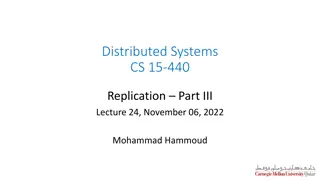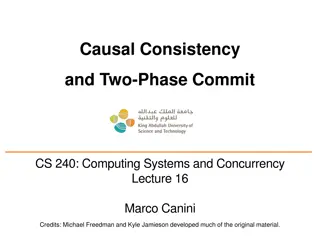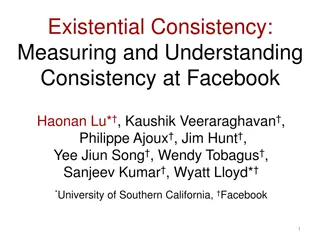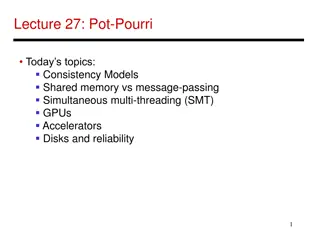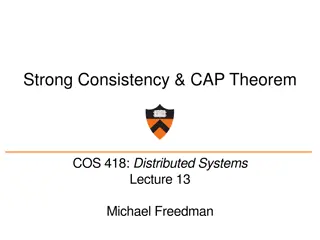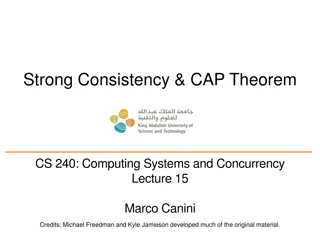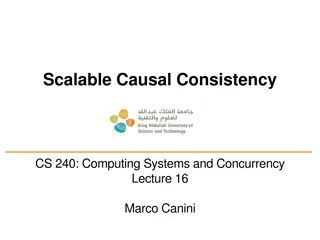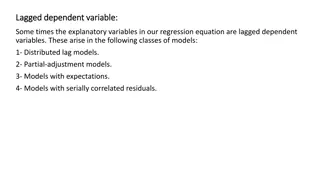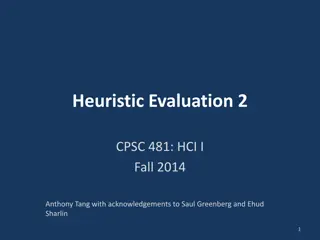System Models in Software Engineering: A Comprehensive Overview
System models play a crucial role in software engineering, aiding in understanding system functionality and communicating with customers. They include context models, behavioural models, data models, object models, and more, each offering unique perspectives on the system. Different types of system
7 views • 33 slides
Models of Teaching for Effective Learning
Models of teaching serve as instructional designs to facilitate students in acquiring knowledge, skills, and values by creating specific learning environments. Bruce Joyce and Marsha Weil classified teaching models into four families: Information Processing Models, Personal Models, Social Interactio
5 views • 28 slides
Consistency Protocols in Distributed Systems
Today's lecture covers consistency protocols in distributed systems, focusing on primary-based protocols and replicated-write protocols. These protocols play a crucial role in ensuring consistency across multiple replicas. One example discussed is the Remote-Write Protocol, which enforces strict con
7 views • 35 slides
Significance of Models in Agricultural Geography
Models play a crucial role in various disciplines, including agricultural geography, by offering a simplified and hypothetical representation of complex phenomena. When used correctly, models help in understanding reality and empirical investigations, but misuse can lead to dangerous outcomes. Longm
4 views • 8 slides
Causal Consistency in Distributed Systems
This content covers the concept of causal consistency in computing systems, exploring consistency models such as Causal Linearizability and Eventual Sequential. It explains the importance of logical clocks like Lamport and vector clocks, and how they ensure order in distributed systems. The concept
1 views • 35 slides
Scalable Causal Consistency for Wide-Area Storage with COPS
This paper delves into the importance of scalable causal consistency for wide-area storage with the COPS system. It explores desired properties such as availability, low latency, partition tolerance, and scalability within data centers. The document discusses the challenges of achieving consistency
2 views • 41 slides
Memory Consistency Models and Sequential Consistency in Computer Architecture
Memory consistency models play a crucial role in ensuring proper synchronization and ordering of memory references in computer systems. Sequential consistency, introduced by Lamport in 1979, treats processors as interleaved processes on a shared CPU and requires all references to fit into a global o
5 views • 64 slides
Discussions on Programmers' Needs, Memory Models, and Consistency in Software Development
Today's discussions covered various topics including what programmers require, the debate on defining memory models for achieving Sequential Consistency (SC), considerations for data-race-free programs, and the performance trade-offs of weaker memory architectures. Insights into partial and relaxed
6 views • 22 slides
Consistency at Facebook: A Study on Existential Consistency
This study explores the measurement and comprehension of consistency at Facebook, focusing on existential consistency. Key topics covered include consistency performance, fundamental tension between consistency and performance, anomalies in Facebook systems, and strategies for quantifying and preven
3 views • 30 slides
Memory Consistency Models and Communication Paradigms in Computer Systems
Memory consistency models define the ordering of writes and reads in computer systems. Coherence ensures write propagation and serialization, while consistency models guide programmers in writing correct programs. Shared-memory and message-passing are two communication paradigms with different appro
5 views • 31 slides
Strong Consistency and CAP Theorem in Distributed Systems
Strong consistency and the CAP theorem play a crucial role in the design and implementation of distributed systems. This content explores different consistency models such as 2PC, consensus, eventual consistency, Paxos, and Raft, highlighting the importance of maintaining ordering and fault-toleranc
3 views • 29 slides
Strong Consistency and CAP Theorem
Explore the concepts of strong consistency, CAP theorem, and various consistency models such as 2PC, consensus, eventual consistency, Paxos, Raft, and Dynamo. Learn about fault-tolerance, durability, and the importance of correct consistency models in distributed systems. Understand how Paxos and Ra
3 views • 29 slides
Developing Dependability and Consistency in Personal Skills: A Comprehensive Guide
Understanding dependability and consistency as essential traits in personal skills is crucial for success in the workplace. This guide explores the meanings of dependability and consistency, their relationship, why they are important, and how to demonstrate them effectively. Students will discover s
2 views • 10 slides
Causal Consistency in Computing Systems
Explore the concept of Causal Consistency in Computing Systems, covering topics such as consistency hierarchy, Causal+ Consistency, relationships in causal consistency, practical examples, and its implementation within replication systems. Learn how it ensures partial ordering of operations and conv
15 views • 31 slides
Scalable Causal Consistency for Wide-Area Storage with COPS
This paper discusses the implementation of scalable causal consistency in wide-area storage systems using COPS. It delves into the key-value abstraction, wide-area storage capabilities, desired properties such as ALPS, scalability improvements, and the importance of consistency in operations. Variou
0 views • 42 slides
Spanner Database Overview
Spanner is a globally distributed database system that offers configurable control, consistent commit timestamps, external consistency, and TrueTime API for handling distributed data. It uses a transaction model with two-phase locking and lock-free reads, providing globally sortable timestamps. The
13 views • 19 slides
Lagged Dependent Variable Models in Regression Analysis
Lagged dependent variables are utilized in various regression models such as distributed lag models, partial-adjustment models, models with expectations, and models with serially correlated residuals. By incorporating lagged dependent variables, researchers can analyze the impact of past values on t
4 views • 11 slides
Eventual Consistency Transactions Overview
Learn about eventual consistency transactions, CAP theorem compromises, and the need for different consistency models in distributed systems and web programming.
1 views • 57 slides
Computer Simulation Models Classification
Computer simulation models are classified based on various characteristics such as static or dynamic, deterministic or stochastic, and discrete or continuous. Static models represent systems at a specific point in time, while dynamic models depict changes over time. Deterministic models involve no r
4 views • 8 slides
Scalable Causal Consistency Using Dependency Matrices
This study explores Orbe, a system that achieves scalable causal consistency through dependency matrices and physical clocks. It discusses key-value data store APIs, partitioning strategies, data center structuring, geo-replication, consistency models, and the implementation of causal consistency in
3 views • 37 slides
Neural Net Language Models & Statistical Models
Neural net language models & statistical language models, n-grams, Markov models, and practical order models. Dive into neural probabilistic language models and scaling properties of models, including performance perplexity. Discover the evolution and challenges of language modeling.
3 views • 22 slides
Database Principles: ACID, CAP, and BASE
Explore the fundamental principles governing classical relational databases such as ACID rules, CAP theorem, and BASE characteristics. Learn about transaction integrity, consistency, isolation, and durability, as well as the trade-offs between consistency, availability, and partition tolerance in di
1 views • 9 slides
Language Models: Probabilistic Models for NLP
Formal grammars provide binary models for language, but probabilistic language models offer a more useful approach by assigning probabilities to sentences. Explore the uses of language models in speech recognition, OCR, machine translation, generation, and spelling correction. Learn about completion
20 views • 13 slides
High Performance Computer Systems Memory Consistency
Memory consistency in high-performance computer systems as discussed by Prof. Chung-Ta King from National Tsing Hua University, Taiwan. Learn about centralized and distributed shared-memory architectures, synchronization basics, and models of memory consistency. Discover the expectations of programm
1 views • 36 slides
Ensuring Consistency in UNFCCC and Kyoto Protocol Reporting and Review Guidelines
Explore the importance of consistency in UNFCCC and Kyoto Protocol reporting guidelines, focusing on issues identified in recent review cycles and potential conclusions. The background emphasizes the responsibility of lead reviewers, supported by the secretariat and ERTs, to maintain consistency acr
1 views • 24 slides
Scalable Causal Consistency
Explore the concept of Causal Consistency in computing systems, which partially orders all operations based on causality, ensuring replicas converge to the same state. Learn about its significance, examples, and how it differs from other consistency models.
2 views • 31 slides
Causal Consistency in Distributed Systems
Explore the concept of Causal Consistency in Distributed Systems through lectures on consistency models, logical clocks, and practical applications. Learn how writes are ordered, concurrent operations are handled, and the role of physical time.
1 views • 39 slides
Causal Consistency in Distributed Systems
Explore the concept of causal consistency in distributed systems, focusing on the order of potentially causally related writes and the handling of concurrent operations. Learn about logical clocks, consistency models, distributed bulletin board applications, and more. Delve into quizzes on the valid
3 views • 39 slides
Strong Consistency and CAP Theorem in Distributed Systems
Explore strong consistency, CAP theorem, consensus models like Paxos and Raft, fault-tolerance, and linearizability in distributed systems. Learn about ensuring ordering between operations, the behavior of a single copy of an object, and the importance of the happens-before relationship. Discover st
3 views • 29 slides
Client-Centric Consistency Models in Distributed Systems
Explore the concept of client-centric consistency models in distributed systems, focusing on providing views tailored to specific client needs. Learn about eventual consistency, basic architecture, and ensuring consistency for mobile users in this informative content.
0 views • 21 slides
Heuristic Evaluation and Interface Consistency in HCI Learning
Explore the principles of heuristic evaluation and interface consistency in HCI, focusing on components like consistency, error recovery, and error prevention. Learn the importance of predictability and different types of consistency within interfaces. Discover how to help users recognize, diagnose,
3 views • 33 slides
Memory Consistency in Multiprocessor Systems
Explore the fundamentals of memory consistency in multiprocessor systems, covering topics like sequential consistency, operational vs. axiomatic models, terminology, and well-formedness conditions. Gain insights into program order, relaxations, coherence, and more.
3 views • 29 slides
Synchronization Models for Consistency
Dive into synchronization and consistency models through topics like wrap-up, sequential consistency, and fences. Explore concepts like Test-and-Test-and-Set lock, Load-Linked and Store Conditional, and Spin Lock with Low Coherence Traffic. Understand how these models work to maintain data integrity
1 views • 18 slides
Consistency Models and Replica Management in Distributed Systems
Explore different consistency models in distributed systems, including data-centric and client-centric approaches. Learn about replica management, server placement, and consistency protocols for ensuring data integrity and availability in distributed environments.
0 views • 35 slides
Foundations of Constraint Processing: Global Consistency Properties
Dive into the world of constraint processing with a focus on global consistency properties such as minimality and decomposability. Explore the concepts of n-consistency, strong consistency, and the extendability to non-binary CSPs. Uncover the essence of every constraint being as tight as possible a
1 views • 41 slides
Consistency Models in Distributed Systems
Explore the concepts of consistency, strict serializability, linearizability, and their examples in distributed systems. Learn about total ordering, real-time ordering, and the pros and cons of different consistency models.
1 views • 25 slides
Distributed Systems: Consistency and Replication Models Overview
Explore the types of ordering in distributed systems, including total ordering, sequential ordering, and causal ordering. Delve into data-centric and client-centric consistency models, as well as replica management and server placement. Learn about the importance of maintaining consistency across di
3 views • 44 slides
Understanding CRDTs and Data Replication Strategies
Explore the concepts of Conflict-free Replicated Data Types (CRDTs), coordination avoidance, replicated data, consistency issues, strong consistency, conflicts, and eventual consistency in distributed systems. Learn about the trade-offs between consistency, availability, and scalability in data repl
0 views • 29 slides
Understanding Memory Consistency Models in Computer Architecture
Explore different memory consistency models like relaxed consistency, sequential consistency, and total store ordering in computer architecture. Learn about the Readers-Writers problem, coherence versus consistency, and the importance of maintaining order in read/write accesses across memory locatio
0 views • 46 slides
Implementing Consistency Models in Distributed Systems
Learn about implementing consistency models in distributed systems, including primary-based and replicated-write protocols to ensure data consistency across replicas. Explore primary-based protocols and the Remote-Write Protocol for achieving sequential consistency. Dive into the coordination of wri
0 views • 35 slides


